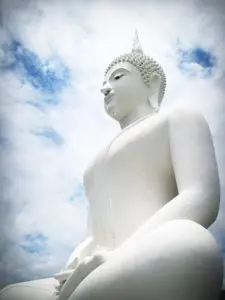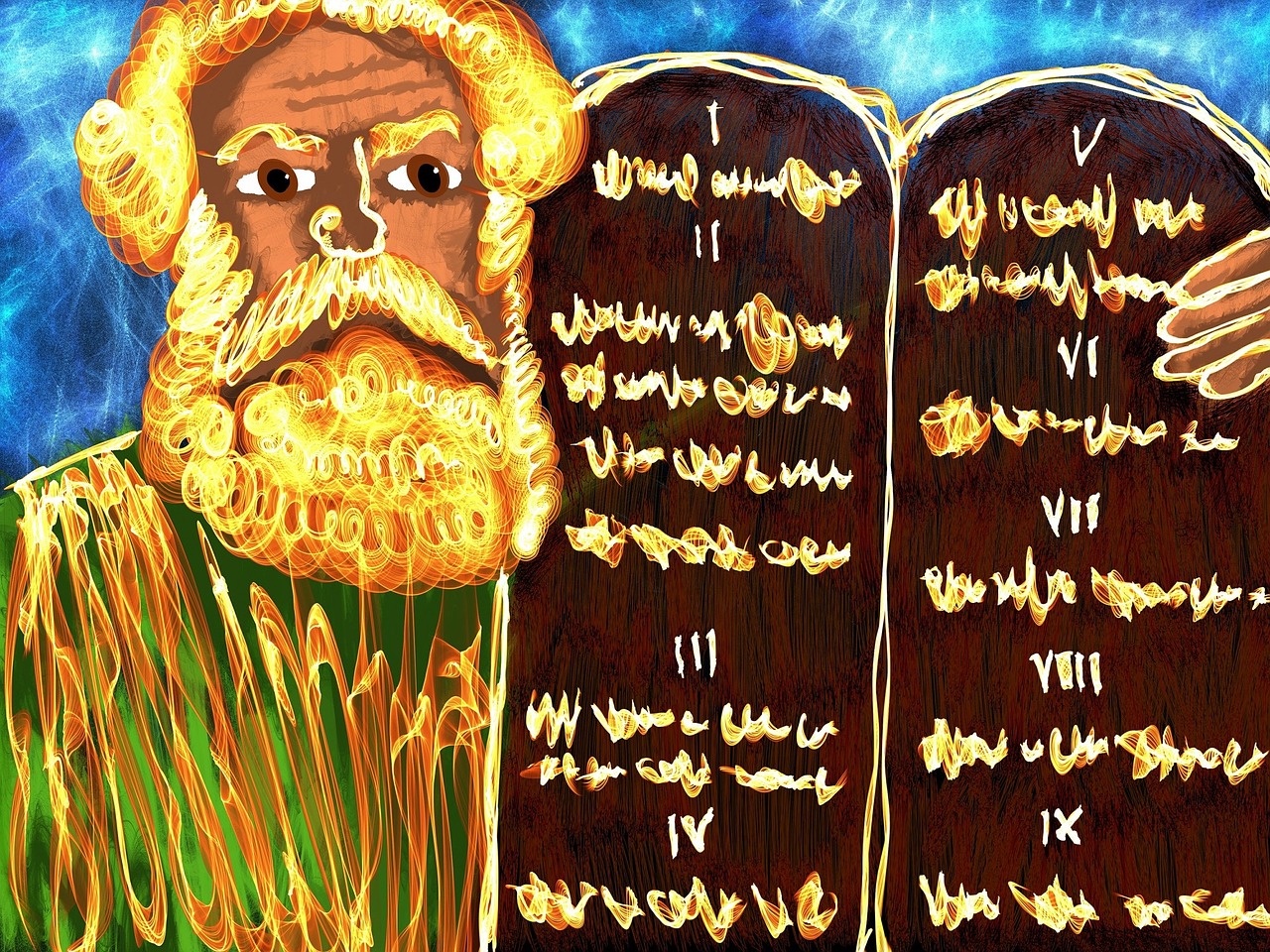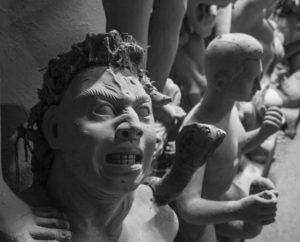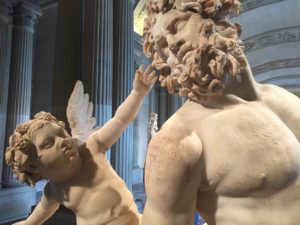The famous Ten Commandments of Moses (the third commandment) include, “Thou shalt not utter the name of the Lord without praise.”
The exact wording is as follows.
“You shall not misuse the name of the Lord your God, for the Lord will not hold anyone guiltless who misuses his name.( Exodus 20:7)
The reason why I am bringing this up this time is because this part of the Ten Commandments is the most difficult commandment for Japanese to understand, and at the same time, it is an essential word for understanding Judaism/Christianity/Islam (Semitic monotheism).
This is because it also involves the fundamental question of “what is the true spirituality” or “what is the true state of human beings?
By the way, let’s take this opportunity to check out all of the Ten Commandments.
And God spoke all these words:
“I am the Lord your God, who brought you out of Egypt, out of the land of slavery.
“You shall have no other gods before[a] me.
“You shall not make for yourself an image in the form of anything in heaven above or on the earth beneath or in the waters below. You shall not bow down to them or worship them; for I, the Lord your God, am a jealous God, punishing the children for the sin of the parents to the third and fourth generation of those who hate me, but showing love to a thousand generations of those who love me and keep my commandments.
“You shall not misuse the name of the Lord your God, for the Lord will not hold anyone guiltless who misuses his name.
“Remember the Sabbath day by keeping it holy. Six days you shall labor and do all your work, but the seventh day is a sabbath to the Lord your God. On it you shall not do any work, neither you, nor your son or daughter, nor your male or female servant, nor your animals, nor any foreigner residing in your towns. For in six days the Lord made the heavens and the earth, the sea, and all that is in them, but he rested on the seventh day. Therefore the Lord blessed the Sabbath day and made it holy.
“Honor your father and your mother, so that you may live long in the land the Lord your God is giving you.
“You shall not murder.
“You shall not commit adultery.
“You shall not steal.
“You shall not give false testimony against your neighbor.
“You shall not covet your neighbor’s house. You shall not covet your neighbor’s wife, or his male or female servant, his ox or donkey, or anything that belongs to your neighbor.” (Exodus 20:1-17)
Is it ok to chant God’s name if not MISUSE?
Now, since the scripture says ” misuse”, then the question becomes, “Is it good if it is not misuse?”…the answer is, “Yes, it is good if it is not misuse”.
For example, in the Christian “Lord’s Prayer,” the second line is “hallowed be your name,” right?
Return from a human-centered worldview to a God-centered worldview
Truth spirituality and witchcraft spirituality
So, I guess the “misuse” is still the point here.
Then, what does “MISUSE” mean? In a word, I think the essence of this is that we must not call God for human reasons.
For the purpose of this article, we can simply classify them as follows
- Truth spirituality: Spirituality that worships the name of God
- Witchcraft spirituality: Spirituality that invokes the name of God in misuse
Again, “misuse” meant “do not call on God for human convenience.
In times of hardship or distress, or more specifically, in times of love, marriage life, income, career success…,
Or, vaguely, we “invoke” or “worship” the name of God in order to invite “luck” or such “consequentialism as a phenomenon”.
Here, it doesn’t have to be “the name of God”, but something very mysterious, for example, “Akashic Records”, “multidimensional universe”, “star reading”, “Twin Rays are…”, and well, there are many patterns.
In short, any spiritual pattern that attempts to pull in mystical forces for one’s own worldly peace and good fortune is “invoking the name of God without thought.
In essence, this is the difference between
- Man-centered worldview
- God-centered worldview
In conclusion, the scripture “You shall not misuse the name of the Lord your God” is a warning against the attitude of trying to influence God for human convenience and against a human (ego)-centered worldview.
As a warning against an ego-centered worldview, the third of the Ten Commandments, the prohibition against idolatry, can be considered in the same context.
*Reference article: Why is Idolatry Prohibited? -Consider Judaism, Christianity, and Islam, Respectively
All three major world religions are “God-centered worldviews.”
Earlier, I said that Christianity and Islam are truth-spiritual.
Buddhism, in general, is not “God-centered” in the religious sense, but it is also not man-centered, and the idea is that “the Dharma comes first.
Well, it is sometimes called “before the Dharma and after the Buddha,” meaning that the Dharma precedes the Buddha.
The order is as follows.
Dharma > Buddha > human beings (= sentient beings)
However, the Buddhist scriptures also say, “He who sees the Dharma sees the Buddha,” so the equation “Dharma = Buddha” is also valid.
Then, the formula is as follows, so we can say that Buddhism also essentially stands on the position of “God-centered worldview”.
Dharma=Buddha>Person (=sentient beings)
In particular, the ” Eternal Buddha” in the Lotus Sutra sense can be understood as the equivalent of the ” One God” in Semitic monotheistic religions.

This means that the three major world religions, Buddhism, Christianity, and Islam, have adopted a “God-centered worldview.
In witchcraft spirituality, people lightly quote “Buddha is…” or “Jesus is…,” but for those who seek the truth, it is necessary to have such humility that it is not enough to throw oneself before “God,” “Buddha,” or “Jesus” in the presence of all five as a spiritual attitude.
And, indeed, there is such a difference in perception and position.
So, the following is a summary of spirituality.
- Truth Spirituality: God-centered worldview
- witchcraft spirituality: Human (Ego)-centered worldview
Fall to a “man-centered worldview” implied by the expulsion of paradise in Genesis
In fact, I believe that “The Story of Adam and Eve’s Expulsion from Paradise” should also be read in this way, as a fall from a God-centered worldview to a human-centered worldview.
Adam and Eve were tempted by the serpent to eat the fruit of the tree of wisdom and choose to become “like God. To be like God, in other words, is to have chosen a man-centered worldview.

This is not an “old story” of Genesis, but a very existential issue that each of us is forced to choose every moment of every day.
When we have a physical body, we are inevitably pulled by our ego-consciousness and inclined toward self-centered (i.e., human-centered) values.
Such a “non-native way of being” is precisely “sin. The root of the word “sin” means “to miss the point.
Therefore, it is necessary to break free from sin (non-originality) and obtain forgiveness of sins through prayer and repentance each time, in other words, to return to a God-centered worldview (originality).










Comments